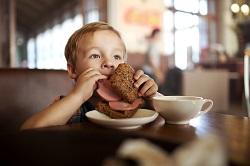A balanced diet is the key to good health at any age but is particularly important in children. The foods your children eat provide the  energy needed for rapid growth and development and normal immune system functioning. The Plano, TX, pediatricians at Willow Bend Pediatrics share a few questions commonly asked about nutrition.
energy needed for rapid growth and development and normal immune system functioning. The Plano, TX, pediatricians at Willow Bend Pediatrics share a few questions commonly asked about nutrition.
What foods will help my son or daughter stay healthy?
Proteins are particularly important in your child's diet. Too little protein can slow growth, weaken muscles, decrease energy and affect normal brain development. Lean beef, poultry, fish and eggs contain protein, but the nutrient is also found in peanuts, lentils, beans, peas, nuts, broccoli, Greek yogurt, milk and cottage cheese.
A well-rounded diet also includes vegetables, fruits, milk and dairy products, and whole grain foods, such as pasta rice and bread. Vegetables and fruits should take up half of your child's dinner plate, while proteins and grains should fill the other half.
What types of snacks should I offer my child?
Healthy snacks that are sugar-free or low in sugar and carbohydrates are best for your child's body and teeth. Although kids can be picky, most will find something on this list that they'll enjoy:
- Raw Vegetables: Carrots, peppers, cucumbers, tomatoes and other vegetables are not only healthy but easy to eat. Kids can eat them raw or dip them in yogurt.
- Fruit: Serve your children berries, apples, melons, pineapple, oranges, mango and other fruits during snack time.
- Cheese: The next time you're at a Plano grocery store, buy a block of cheese or a package of string cheese. Cheese not only contains calcium essential for strong bones but also provides zinc, magnesium, and vitamins A, B2 and B12.
- Other options: Peanut butter spread on celery, whole grain pretzels or popcorn, rice cakes, hard-boiled eggs and turkey wraps are all good snack options.
How can I handle hunger pangs?
Does it seem as if your child is always hungry? Feed him or her a snack high in fiber. Fiber helps kids (and adults) feel fuller longer and also keeps food moving through the digestive tract. When food doesn't linger in the digestive tract, your child will be less likely to develop constipation. High-fiber foods include whole grains breads and cereals, whole grain English muffins, apples, bananas, berries, green peas, baked sweet potatoes, and pears.
Do you have questions or concerns about your child's diet or development? Call the Plano, TX, pediatricians at Willow Bend Pediatrics at (972) 403-9355 to schedule an appointment.
